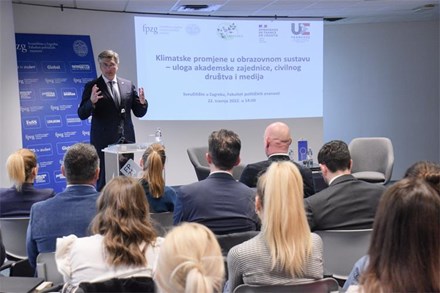Plenković gave his talk as part of an event called "Climate change in the education system - the role of the academic community, civil society and media", held to mark Planet Earth Day. It was organised in partnership with the Tatavaka NGO and the French Embassy.
The world today is facing very serious crises, from the COVID-19 pandemic and resulting economic crisis to the Russian invasion of Ukraine, with serious humanitarian and geopolitical consequences for the international order and disruptions to the global energy market and food supply chains. Such a combination of global crises has not happened in a long time. In addition, in the last 60 years alone, the world population has increased two and a half times, while energy consumption and greenhouse gas emissions have increased four times, Planković said.
Every three years, the sea level rises by one centimetre, and this trend is now accelerating and posing a growing threat to many coastal cities, including ours. Rapidly increasing climate change might cause much greater disruptions in the decades to come and completely change life on Earth unless the green transition is accelerated globally in the coming years, he noted.
He emphasised the need to reduce greenhouse gas emissions as the main cause of global warming. That's why the EU has recognised the fight against climate change as the key priority and set itself a target in the European Green Deal to become the first climate-neutral continent by 2050. The geopolitical context of the Russian aggression against Ukraine and Europe's dependence on Russian coal, oil and natural gas are additional reasons for a faster transition to renewable and decarbonised energy sources so that Europe can become energy independent and not be blackmailed by undemocratic regimes that use energy as a weapon, Plenković said.
We are ready for second block of Krško Nuclear Power Plant
Plenković said that under his government Croatia put the green transition at the forefront, launching the energy and green transition over the last five years by enhancing energy and climate legislation.
Croatia is expected to reduce CO2 emissions by 45% by 2030 and stop using coal by 2033, "perhaps even sooner," he said, adding that another goal is to reach 29% of renewables in end consumption by 2030, using the country's own potential in the process.
Croatia meets 21% of its annual gas consumption from domestic production, importing 22% from Russia and 57% via the LNG terminal on Krk island, Plenković said, adding that if there was no terminal, "all imports would be coming from Russia, which is the best indicator of its importance."
He said Croatia saw nuclear energy playing an important role in reducing the dependence on Russian gas and in low-carbon development. Today Croatia produces 15% of its electricity from nuclear energy.
"We are ready to realise, together with Slovenia, the project of a second block of the Krško Nuclear Power Plant, which in ten years could produce another third of electricity for households and enterprises."
.jpg?preset=article-main-img)
.jpg?preset=gallery-thumb)


.jpg?preset=gallery-thumb)


